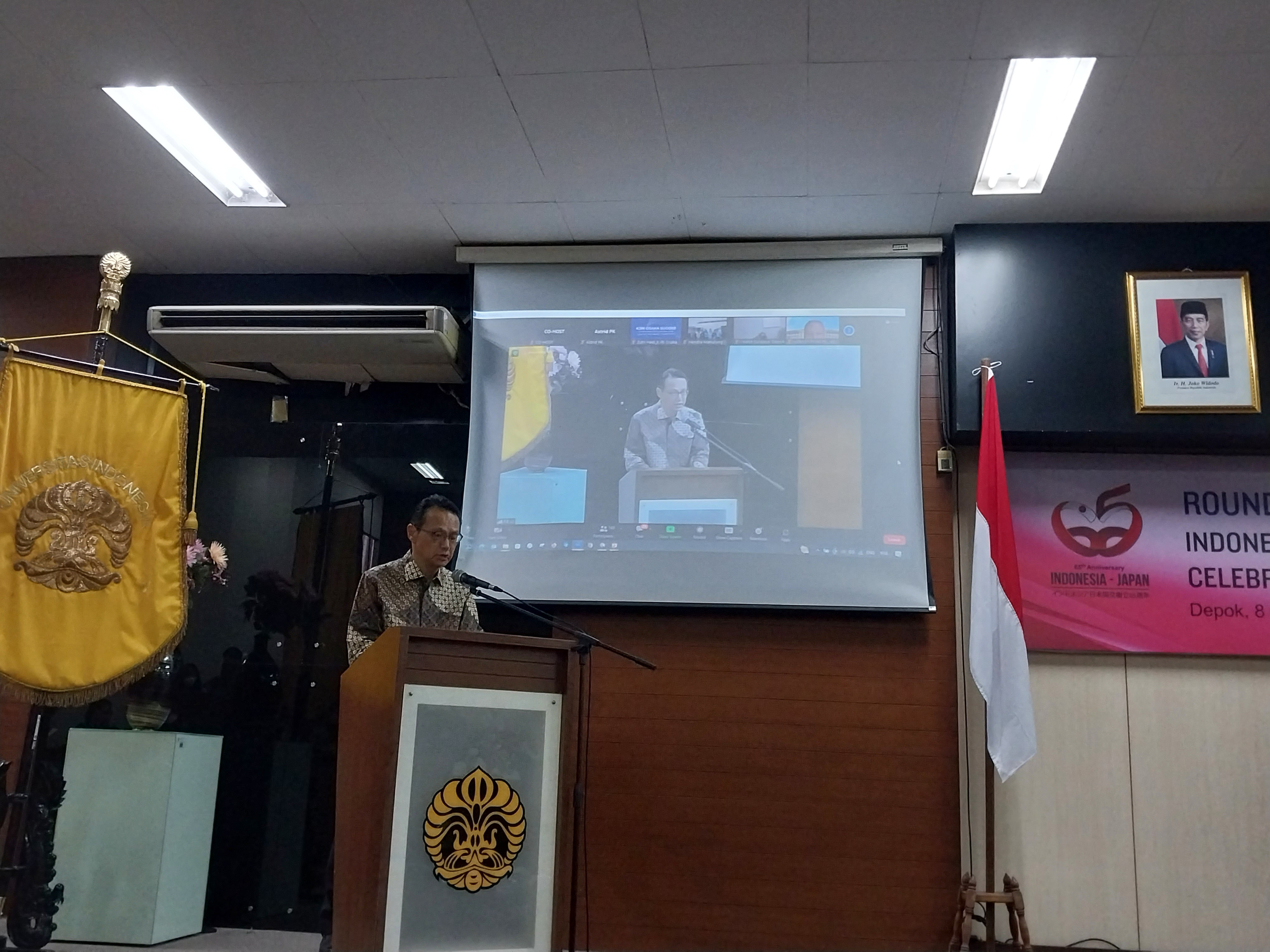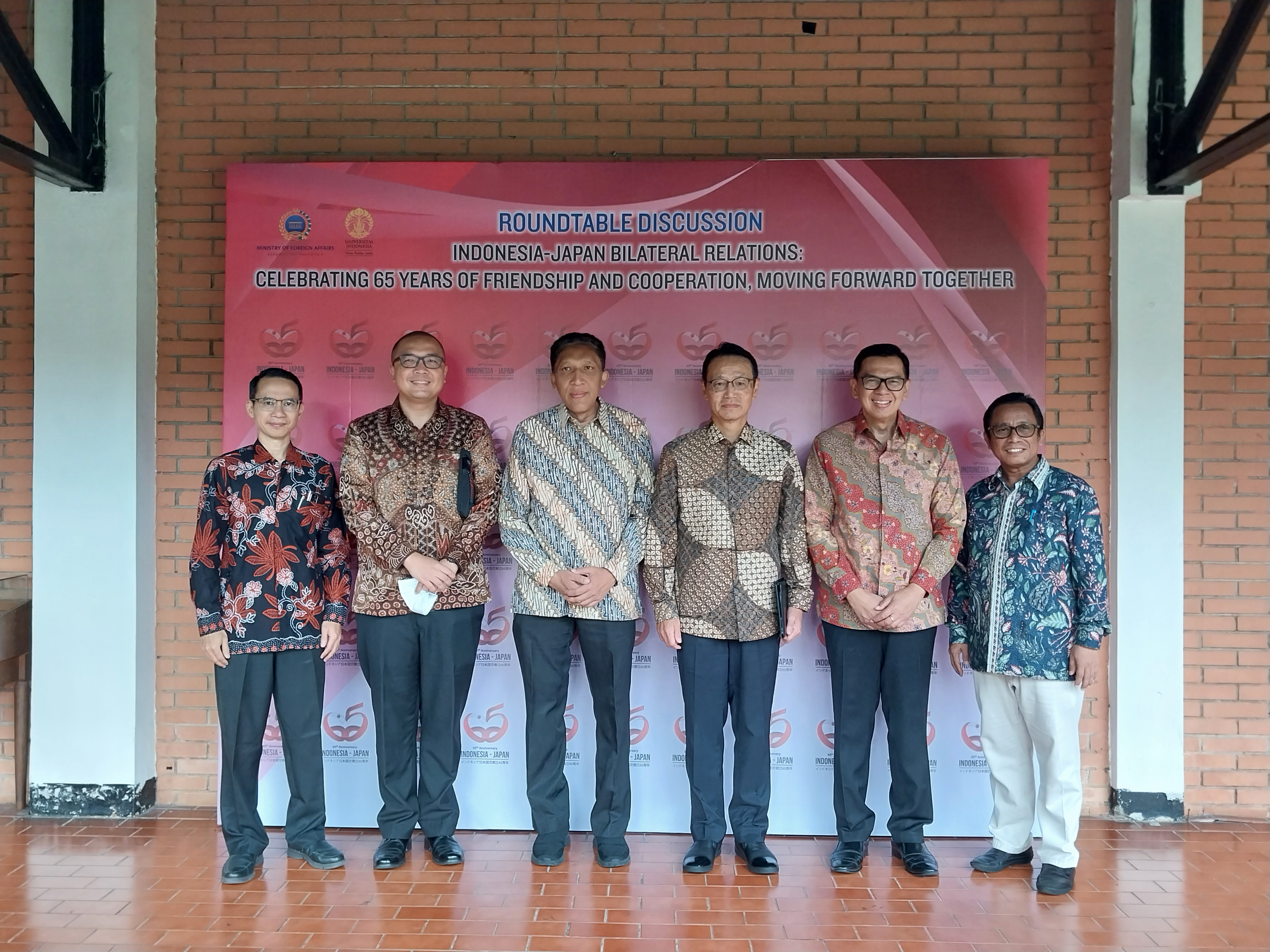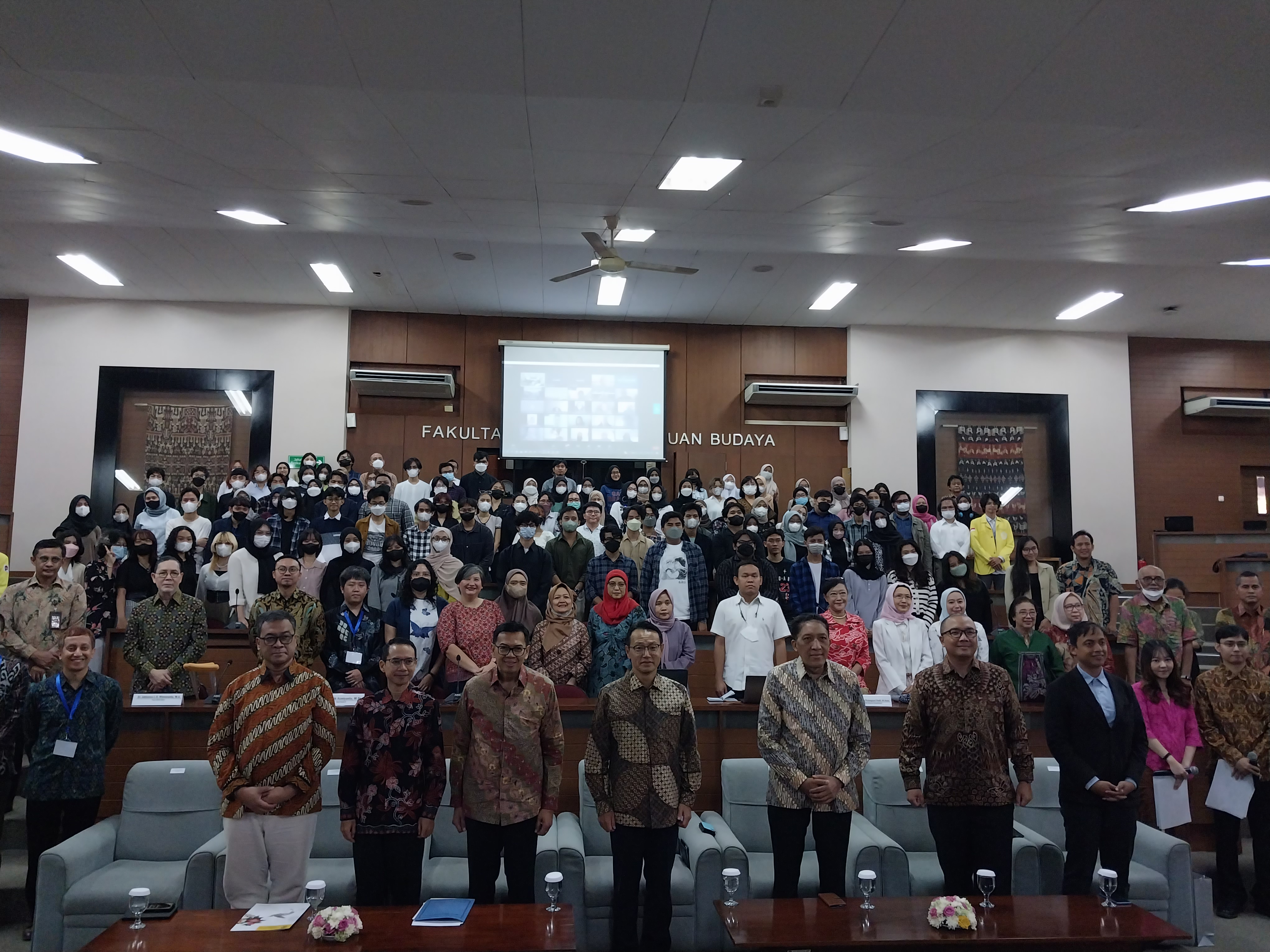Informasi, Kebudayaan &
|
Jakarta, 25 Mei 2023 Duta Besar Kanasugi menghadiri acara diskusi di FIB UI (event peringatan 65 tahun Jepang-Indonesia) Pada tanggal 8 Mei, Dubes Kanasugi berpartisipasi pada sebuah acara diskusi yang diselenggarakan sebagai event Peringatan 65 Tahun Hubungan Diplomatik Jepang-Indonesia di FIB Universitas Indonesia.
Dubes Kanasugi memberikan pidato mengenai hubungan kerja sama Jepang dan Indonesia sampai saat ini dan di masa depan. Isi pidato beliau adalah sebagai berikut by Ambassador of Japan to the Republic of Indonesia At Roundtable Discussion on Indonesia-Japan Bilateral Relations: Celebrating 65 years of Friendship and Cooperation, moving forward together. It is nice to be back to the campus of University Indonesia. Thank you for your inviting me to this roundtable to say a few words on overview of Japan-Indonesia Strategic Partnership. At the outset, I wish to express our sincere appreciation to the Ministry of Foreign Affairs of Indonesia and University Indonesia for making strenuous efforts to organize this significant occasion. Our two countries started to define our relationship as strategic partners back in 2006. Why did we do so? Why can we call our partnership “strategic”? Is it merely a diplomatic nicety? No, I don’t think so. Looking from my own perspective, there are three important elements which relevant countries, such as Japan and Indonesia, need to share when they call their partnership as “strategic”. First, values: Japan and Indonesia share fundamental values such as freedom, democracy, human rights, and the rule of law. Second, strategic objectives: As two of the largest maritime democracies in the Indo-Pacific, one of the most important strategic goals we share is to maintain our region free, open and prosperous. Our two countries share such strategic objectives. Third, actions: Japan and Indonesia often act together in order to uphold the fundamental values and maintain and enhance the strategic environment in the region. Both countries are important members of the G20, as well as APEC and RCEP. In these international fora Japan and Indonesia collaborate to advance our national interest as well as interest of the participating members. These three common elements make our relationship strategic partners. Then, what have we been doing to make our partnership truly “strategic”. When we talk about our bilateral relationship, we tend to focus on our economic cooperation, including trade and investment relations. However, in recent years, our two countries have been increasingly proactive in enhancing our defense and security cooperation. Indonesia is the very first ASEAN member country with which Japan established “2+2” foreign and defense ministers’ consultation framework in 2015. Last year was an epoch-making year for our defense cooperation. Japan and Indonesia, together with the United Nations, started to hold a trilateral Peace Keeping Operation training at the PKO center in Bandung. Also, Japan took part in the Super Garuda Shield military exercise for the first time in its history. As you may know, the Garuda Shield has been Indonesia-US joint bilateral military drill, and last year the two countries decided to make it into a multilateral exercise inviting 13 other countries. Japan was one of such invitees, and Japan Ground Self-Defense Force conducted along with Indonesia and the US an airborne parachute exercise. I was fortunate enough to witness the exercise on the ground together with the commanders of Indonesian and US armed forces. From a broader perspective, Japan and Indonesia have deepened their collaboration to make political, economic and security environment in the region more favorable. On its part, Japan has been promoting the concept of Free and Open Indo-Pacific (or FOIP) and we repeatedly made it clear that Japan’s ties with ASEAN countries constitutes a core element of peace and prosperity in the Indo-Pacific region. On the ASEAN front, Indonesia took the leadership to come up with ASEAN Outlook on the Indo-Pacific (or AOIP). Foreign Minister Retno in her Annual Press Statement this January outlined Indonesia’s priorities for this year’s ASEAN Chair by saying “An Indo-Pacific region that is peaceful, stable, respecting international law and prioritizing inclusive cooperation is the key for ASEAN to become the Epicentrum of Growth in the region and the world”. I cannot agree with her more. This year provides an ideal opportunity for Japan and Indonesia to enhance our collaboration to make the region more peaceful, stable and prosperous as Japan and ASEAN cerebrate 50th anniversary of friendship and cooperation with Indonesia as ASEAN Chair. I cannot conclude my remarks without referring to our bilateral economic interactions. On the government front, Japan is by far the largest Official Development Assistance donor to Indonesia, with accumulated ODA of more than 50 billion US dollars. Japan is the second largest foreign direct investor to Indonesia on accumulated basis, with nearly 2,000 Japanese companies operating throughout this country. These companies employ about 7.2 million Indonesians, together contributing to roughly 8.5% of Indonesia’s GDP and close to 25% of its export. Traditionally, Japan’s investment has focused on auto and auto parts, as well as power plant projects. In recent years, however, Japanese companies are increasingly diversifying sectors of their investment, including property development, finance, retail, and foods and beverages. By doing so, we are enhancing the win-win economic relationship between our two countries. On top of that, Japan and Indonesia unify our strength to achieve smooth and realistic energy transition. Both countries are heavily dependent on fossil fuel for electricity generation: in the case of Japan 60% and Indonesia 80%. Under such circumstances how to achieve carbon neutral at the target years is a common challenge for our two countries. That is why Japan and Indonesia take the leadership to advance a concept on Asia Zero Emission Community (or AZEC) under which we try to implement smooth and realistic energy transition without disrupting our economic growth. Also, Japan, along with the United States and other G7 plus like-minded countries, agreed with Indonesia to launch Just Energy Transition Partnership (or JETP Indonesia) which will support Indonesia’s efforts in the transition from coal to renewable energy. This year, as we know, Japan and Indonesia cerebrate 65th year of diplomatic relationship. While we are silently proud of the achievement of our past 65 years of cooperation, we can and must do more. Japan and Indonesia as strategic partners will work together not only for the sake of our two countries but also for the Indo-Pacific region and the world, not only for the current generation of people but also the people in our future generations. For that purpose, I look forward to fruitful discussions today. Thank you for your kind attention. (End) |

Kedutaan Besar Jepang di Indonesia
在インドネシア日本国大使館
在インドネシア日本国大使館



